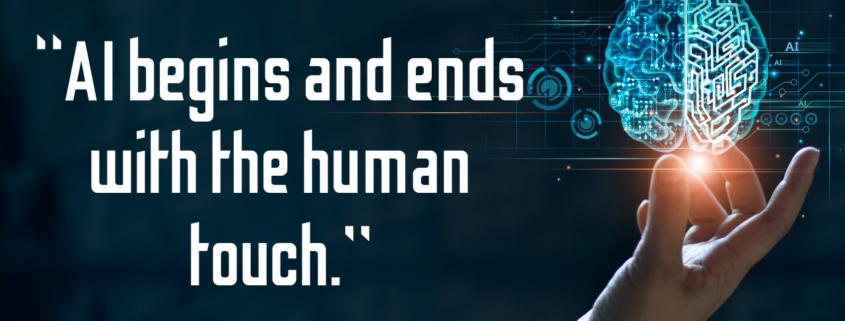It’s Your Decision: How Corporate Boards Use AI
Is your board of directors ready for the future? Are you?
AI is creeping into the boardroom. In fact, one company now has an AI bot on their board! That shows AI issues are now fiduciary and ethical considerations for any board member, yet few directors are truly future-ready. Our guest, Helle Bank Jørgensen, has lots of wisdom to share thanks to her experience as CEO and founder of Competent Boards.
ILI is all about future-ready leadership. We can help you with your board, especially when it comes to leadership in the age of AI. We actually wrote the book on it! Learn more at InnovativeLeadership.com.
To paraphrase the Spider-Man proverb: “With AI power comes board responsibility.”
As artificial intelligence continues seeping through our workplaces, it presents major fiduciary and ethical risks complacent boards of directors don’t see – but competent boards are acting on now.
There’s no denying that AI showers a wealth of potential to aid decision-making. These five guidelines will help your board make those decisions wisely and mitigate risks for your organization. They’re based on expert guidance from this week’s podcast guest: Helle Bank Jorgensen, the founder and CEO of Competent Boards.
1. Can you trust your AI?
First and foremost, you have to be able to trust the information an AI system is giving you. This goes beyond the misinformation and disinformation on social media. AI is only as good as the data it’s trained on, so determine how objective, accurate, and robust the system’s data is. Programmers can even introduce their own personal biases without realizing it. So, think hard about the guardrails you want in any AI systems you use, then continually eye your trust in them. In this way, trust becomes a bridge between the tech and its users.
2. AI enhances decision-making; it doesn’t replace it.
Some complacent boards are already blindly accepting AI results as decisions. But if they lead to problems, the legal responsibility (and consequences!) remains with you, the human board member. So, think of AI only as an advisor, one who curates and simplifies comprehensive company data for you—while you apply your very human critical thinking and experience-driven intuition to shape the final decision. The bottom line: you’ll be held accountable, so insert yourself into every equation!
3. Remember the risks.
This can’t be emphasized enough. AI is very susceptible to the old coder’s adage of GIGO: Garbage In = Garbage Out. One bit of bias, one byte of false data, and your AI’s conclusions will be off the mark. That bad data can be accidental or intentional (like Deepfake videos). Relying on distorted reality leads to off-target—and potentially fatal—business decisions. Heed Helle Bank Jørgensen’s mantra from our podcast: “Trust is a big, big word.”
4. Be healthily skeptical.
This is a guardrail building on Guideline 3 above. Given the risks of data reliability, balance AI’s vast potential with a discerning perspective. You have real-world experience, insight, emotion, and intuition. Together, they give you a very human edge in judgment. Use it! But don’t let it cloud your judgment to become too risk-averse; one major advantage to AI is that it often sees counterintuitive trends and solutions humans can’t. So, balance is key here.
5. Learn to recognize and mitigate the inherent biases.
AI is structured by human coders. And humans are far from perfect! From insular thinking to confirmation bias, some slant is therefore inherent in any AI system. There’s no one solution to this, although the more diverse the thinking and experiences of your AI’s developers, the more these invisible biases can be avoided. Ultimately, though, you’ll need to rely on critical examination, self-awareness, and challenging pre-conceived notions to assess AI’s results.
Through all five guidelines, one conclusion becomes crystal clear: AI truly begins and ends with the human touch.
Artificial intelligence sits at the very beginning of unprecedented growth into every corner of the business world. The stakes only grow higher from here. So, how competent is your board? And what will you do to make it future-ready? The organizations that start upskilling their boards now will be best positioned for the fluid futures ahead.
The Innovative Leadership Institute intensely studies the interplay between AI and leadership. Join us for our webinar about it; you’ll find details below. Our latest book addresses it; Innovative Leadership and Followership in the Age of AI. And check out our online courses and coaching services at InnovativeLeadership.com.
This article was adapted by Dan Mushalko from the Innovating Leadership: Co-Creating Our Future podcast episode Competent Boards By Choice, Not Chance with guest Helle Bank Jørgensen, CEO and Founder, Competent Boards.
Thank you for reading the Innovative Leadership Insights, where we bring you thought leaders and innovative ideas on leadership topics each week.
The Innovative Leadership Institute strives to elevate the quality of leadership worldwide. If you are looking for help developing your leaders, explore our services.


Leave a Reply
Want to join the discussion?Feel free to contribute!